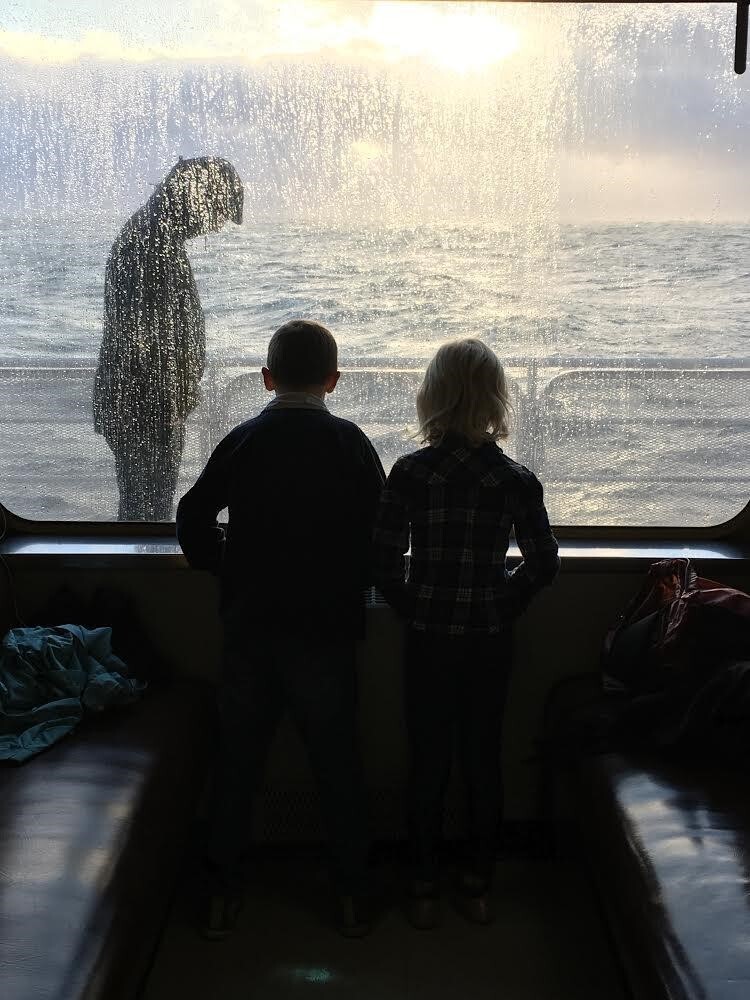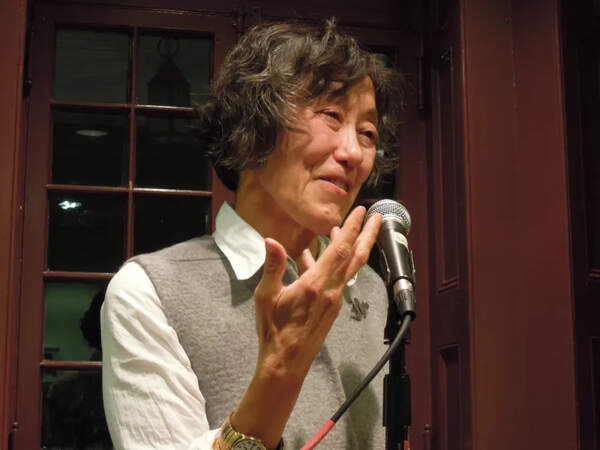Interviews
Buckle & Swash: Heather McHugh interviewed by Kary Wayson
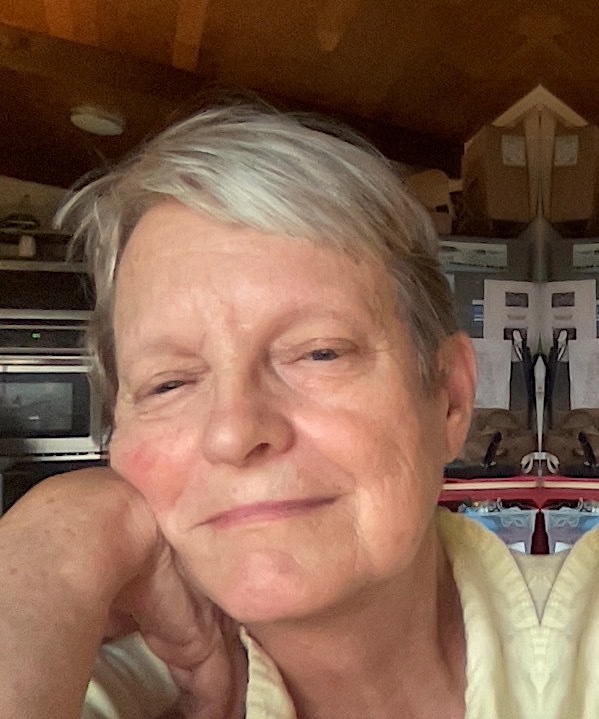
Heather McHugh was born in California and raised in rural Virginia. She entered Harvard University at the age of sixteen and published her first poem in the New Yorker two years later. Since then, her books of poetry have been finalists for the Pulitzer Prize and the National Book Award. They include Dangers (1977), A World of Difference (1981), To the Quick (1987), Shades (1988), The Father of Predicaments (2001), Eyeshot (2004), Upgraded to Serious (2009), and Hinge & Sign: Poems 1968-1993 ("Notable Book of the Year" in the New York Times Book Review). McHugh is also an accomplished translator/adapter, doing versions of the work of Paul Celan, Blaga Dimitrova, Jean Follain, and Euripides. Her book of literary essays, Broken English: Poetry and Partiality includes one of the best essays ever written on the work of Emily Dickinson.
As Matthea Harvey put it so memorably in her introduction to their 2005 BOMB
interview, “Anyone who has talked with Heather McHugh, read her poems and essays, or seen a Road Runner cartoon, knows what it is to feel like Wile E. Coyote, left in the dust as something wonderful, contradictory, and strange dashes by.” That’s exactly how it was when I was McHugh’s student at the University of Washington in Seattle, where she taught from 1983 to 2014. McHugh’s crackling intelligence, famous generosity, and warm (somehow) cool-girl quality made for a heady mix.
I fell in love with McHugh’s poetry a few years later. I’d graduated by then, and I was working as a waitress. After one of my long Sunday-morning brunch shifts, I sat at the edge of the chaos and camaraderie of my coworkers and picked at my eggs at the horseshoe-shaped bar while I read McHugh’s The Father of the Predicaments, which at that time had just been published. It begins with “Not a Prayer,” a long poem which takes as its subject the death of the cellist Raya Garbousova, a woman who came into McHugh’s life when McHugh was in her twenties, and whom she’s called her “soul’s mother.” I knew nothing of any of that as I began: “We sleep inside a bullet— / cheek to cheek in public / anonymity. . . .” My connection with the voice was immediate—and irresistible. I read the poem straight through (it’s sixteen pages long) almost without taking a breath, head in hand, tears down the sides of my face. Then I started again, back at the beginning: “— and then we wake. We do // not speak. . . .” I read it all the way through a second time, spellbound, rapt, until I realized everyone else had left. I grabbed my things and stumbled, reeling, out onto the bright sidewalk, the sun “a red-eye, and the earth / a fast blue rushing underneath.”
This interview took place over several exchanges during COVID 2020-2021, as McHugh was entering her seventies, and not long after Muddy Matterhorn, her first book in a decade, was published by Copper Canyon Press. We talked about many things, including love, death, aging, music, #MeToo, and the importance of having an artistic godmother. The photos that follow are McHugh’s own.
—Kary Wayson
I’d love it if you started out by locating us—where are you?
I am living (of late) in a rural area south of Port Townsend on the Olympic Peninsula. I wouldn't be here if it weren't for my fair-play attempt to triangulate with my late-life passion (it's a man). We both are wedded to some origin and independence stories—his centering on Washington State, mine on British Columbia; but at the moment we're fair-smitten with each other, and at seventy and up, I tell you that's a sweetness you don't want to jeopardize.
Muddy Matterhorn is your first book in ten years. You’ve spoken elsewhere about a time after winning the MacArthur when you stopped making poems. I remember asking you at that time if the stoppage made you anxious or fearful—and, memorably, you replied that you felt no anxiety about your artistic output because your senses of curiosity and wonder were alive and well. Have there been times when you have worried over such things?
Not really. There were always so many forms of play to work at! Poems are only passages, and all art forms remind you passages are openings. I'm promiscuous about the arts. I was writing jingly verse when I was four, but I also always loved visual design and architecture; as a teen I painted and sculpted; recently I played around a bit with sound files and spoken word. I took time out from teaching, too, for the caregiver-respite project. That benevolence itself changed me, taught me plenty, changed its own forms. (Nonprofits seem to need more gifted profiteers than I.) In any case, after times away, I seem to home to poems.
So what do you worry about?
I worry when
I write, not when I don't.
I hate being visible but wind up being seen—I neither dazzle nor boggle (indeed nowadays I waddle, what with the weight and the bad knee). Stuff like that would have worried me, in my teens, but not so much since I started, around age eighteen, to pay for my own Twinkies. (Well, in all good taste, let's call it baklava.)
As for rent (or its garments and garnishments), god knows I won't let anybody else make me a living, or make me a mannequin. I've been lucky to have choices, especially in the form of jobs without dress codes, jobs without punch cards. I have cut back on some fancies: Fancy dress and fancy fender I can live without. I do have a surfeit of sensory alertness: the senses are freedom's luxuries.
Senses I can exercise, senses I can move and be moved by, keep me fond of life. I do adore the STIR of sights and sounds and the break from my own self-cycling mind. Given an open door I can revisit the world, revise myself.
From the start instinctively I was attracted to the word-musicians and poets who reminded me how much was outside ordinary frames of our control: Stein for the neurolinguistic networks of "Tender Buttons"; Stevens for giving over aesthetic mastery to the ultimate independence of artistic occasion (see “So-and-So Reclining on Her Couch”); or take a look at Robert Creeley's "The Window,” where responsiveness is sensory responsibility, and where every line gets its due.
What do you think about your output now?
I think I need some anti-diarrheal. Maybe Metamucil.
What's your work ethic? Does it apply to your poetry?
Ethic, schmethic. I don't have one. I do the writing when it wants me to. Is that an ethic? I went to lots of churches (my father's marine biological lab seemed a temple to research, even for a kid—maybe especially for a kid: There were big tanks outside with sea turtles and other creatures in them). And in my seventies the search goes on, to see even a bit of what exists. The search itself begins to lead me far from words. (Or too far into them to follow. I've never had a mind to lead.)
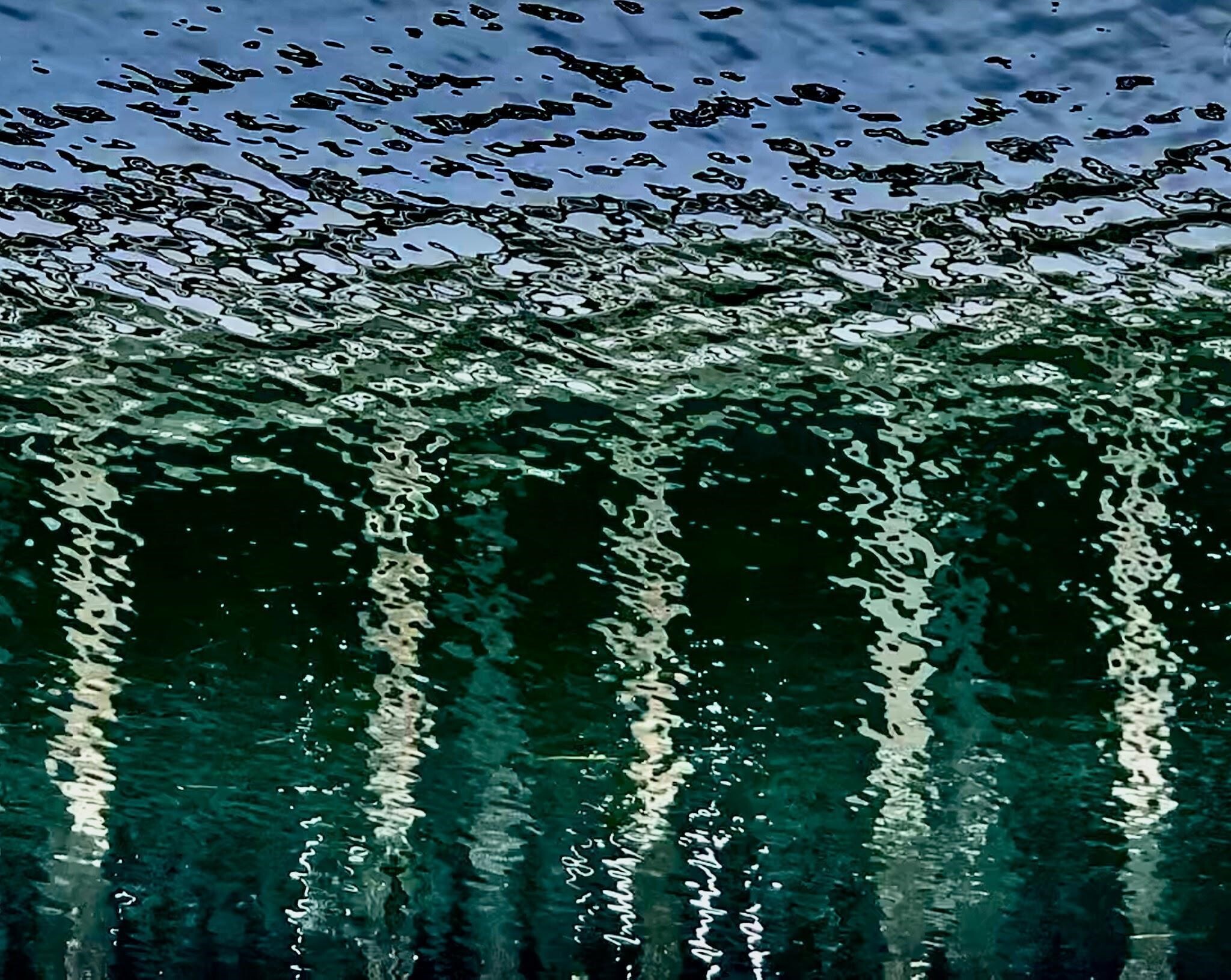
Regarding making books and poems and photographs: Do you hold yourself accountable to any expectation as to kinds or quantities?
God, no. If I can get a camera or keyboard close enough to frame a moment's whole unfinishability, that's quite enough. I mostly wish to go back to the years before the word “career” careened into my consciousness. Must have been a counselor— we call them life coaches now— who coined it. (There I was, at my little wooden desk, happily spinning jingles for sheer joy, when they handed me that first enormous pencil. Must have been a half an inch across. Soon I had to look up “graphite.” And you know where THAT stuff can lead.)
A publisher at Wesleyan once warned me that her authors were accustomed to producing books of verse every three-point-five-some years. It smacked of the toothpaste factory! My squiggles aren't so regular. I did go ten years, once, between books; one year I got two books done plus several broadsides, who knows how? When I was young and poor, I found out magazines would pay a poet by the line, inducing many souls to chop their lines in half. Or less. (Has anybody researched correlations between fashionable line length and the journal payment protocols?)
But even then, I never made enough to buy a round. (A round for the bar, I mean, not for the Browning . . . Hell, there are Barrett firearms too, in case you didn't know! Among the cognoscenti, those are known for having fewer monologues.)
O kinds! O quantities! The earliest MFA writing programs needed "professional" accreditation; so the lexicon of scholarly and critical specialties remains in traces—student verse collections trotted out as “theses” and so on . . . (Language-lovers rebel! The only argument is with oneself!) But money famously makes the whole square world go round, and money's gravity is government, and government's economy is not inherently poetic. Not easy for an MFA to prove itself the “terminal” degree in its own field—and oh, we wanted to! The lure of professionalization! The jargon! Thank the lords of luck my Real Job wasn’t that.
My Real Job’s feeling for the hidden forces in the patterning of words. My Real Job’s answering some callings that a lot of other people would not give a shekel for. My Real Job isn’t paid. It's hardly even advisable.
But obviously irresistible! OK—so back to poems.
You can’t get there from here. (Pity the interviewer trying to get a straight answer out of a twisted mind.) OK, I’ll try to be good. There's lots to say about POEMS. I've spent forty classroom years attempting to get even ONE thing said and done on that subject. About how the poetic is to be treated more as an object than a subject, although there are no opposites in nature, and a self is a very odd object. About how a poem is no less formal for its format being “free,” and no more formulaic for its tending to its forms. About how dealing with sequences of poems (for collection into books) is every bit as painstaking as any other art of pieces, pieces of art.
By parts of art I don't mean just the font, the cover, the texture of texts (stirring old shirts into the mix, for rag contents replete with musk) . . . and I don’t just mean emblazoning your books with surnames or sub-titles—or, for that matter, contending with the innate refusal of some sequences to tolerate titles or section heads. (I’m a big-time fan of Alan Dugan's stubbornness in giving so many poems the same title: "Poem." Referees as referents!) Those matters matter to the larger-scale designs sometimes, of course, and few enough poets get a say in them. But the poet who is orchestrator and arranger of the larger work’s emerging urgencies winds up having to allow for utterly unscheduled re-arrangements of the senses. You can’t make sense before the poem does. All artistic vision is revision.
Poems lose their luminousness if you decide deciding has to happen in advance of the poem’s emergency, if you take a stand on just one side of the occasion’s circumstanding. Forms are not imposed on the material—they must arise from it, outrace the “information”—then material and mind can stand a chance to fly.
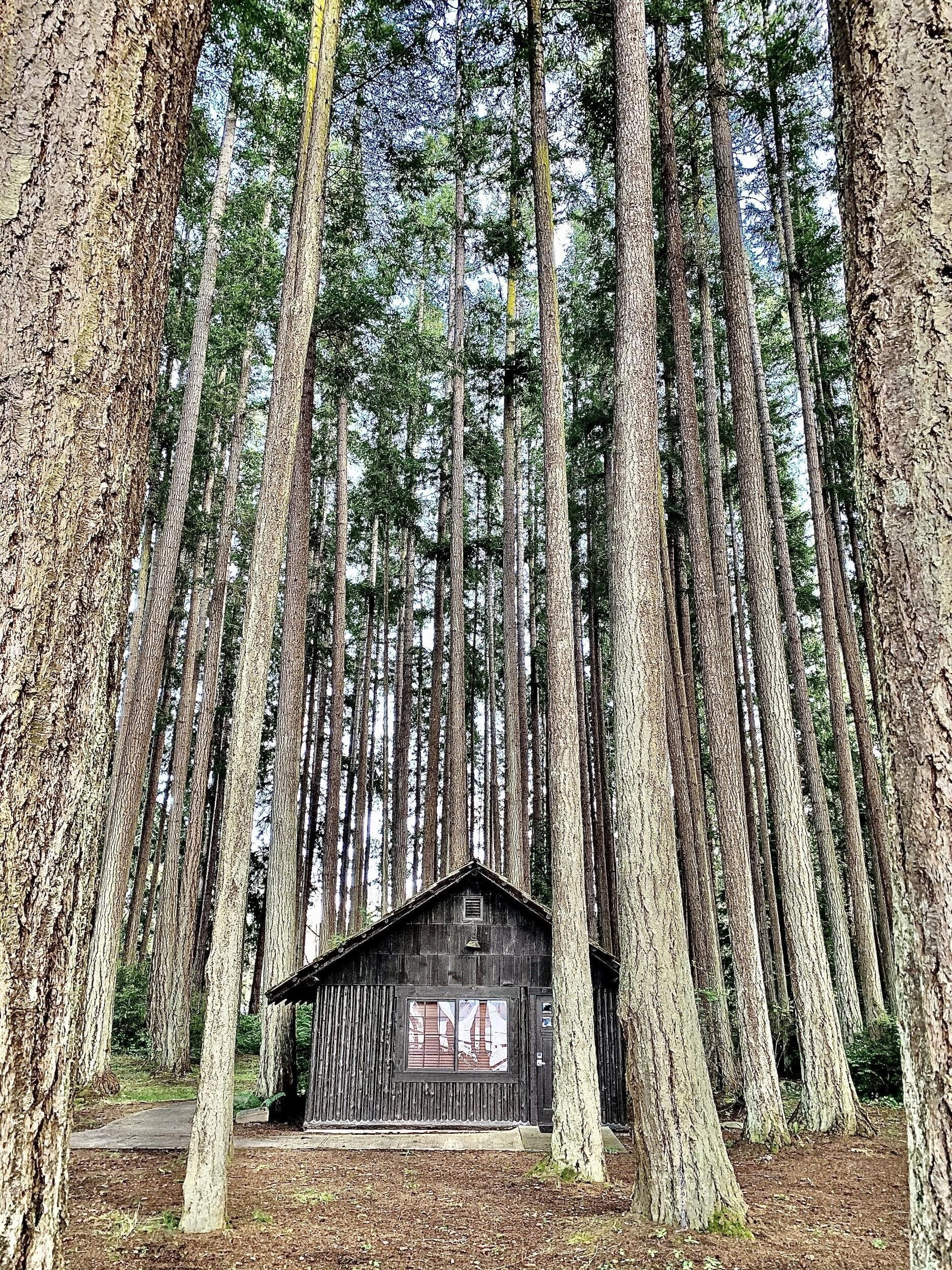
What has it meant to me, to be a poet all my writing life? It meant I couldn't keep my languages confined to words—or keep my feeling for the words distinct from all the other audible or visible designs. It takes an authorizer to identify an author, but I didn't want the stamp, only the freedom. Degrees, reviews, acceptances for publication, pages of acknowledgement—with them we're back at the accreditation agency. And eew, I always hated bookkeeping.
Occasionally a poem makes (a little) moolah, if the media or agencies will chance to pick it up, or pass it on. But better not rely on that. You have to do it for the hunger, or the thrill in skill; the feel of the curve; the swerve of the love. Same reason you would fish, or learn to fly.

Would you describe your composition process, how it may or not have changed over the years?
Let me compose myself.
In rural Virginia, when I was eight or so, my mother found me one uncommon teacher. Her name was Florence Norwood. Born in Austria, she wound up in a run-down shack in the Virginia backwoods, a wizened widow, in her eighties. I knew nothing of that mysterious trajectory. I was seven or so. The place had an outhouse and a cast iron cookstove. When I came on foot to take my lessons every week, the shack would smell of smoke, and Mrs. Norwood of her Manischevitz. She had a Steinway grand in there, stacked round with towers of sheet music. It was at her hands I fell in love with Bach and Chopin.
A few years later, when my family moved to the DC suburbs, this Mrs. Norwood gave me a goodbye gift: her dead sister’s ornate Old-World watch, an instrument of delicate, excruciating works! with a tiny pointed purple sapphire on its winder! For ages, or for decades anyway, I kept that wonder in a prized-possession box—then one day on an impulse gave it (in an ill-considered burst of wishes) to a friend I loved, and knew was dying. (Cruelest gift, in retrospect.)
By then it had already flown so far: I wonder where it now keeps time.
So little's keepable. (And nothing's big.)
*
Could she have sensed in me already then, despite my groping ways on the piano, some presumable affinity for arts, with all their eloquent precisions? Many seasons later, many states away, it was a family of arts appreciators who would nourish what Mrs. Norwood recognized in me.
Raya Garbousova was a presence of phenomenal warmth and humor. Born in Tiflis, she’d been plucked as a young cellist into an international solo career, and I was lucky (in the early seventies, in my mid-twenties, her late-fifties) to become her bubeleh and Heatherchik. By then she was already relinquishing a life of stage performance (so many airports to negotiate, so many audiences, the after-show receptions and the interviews) and adapting to the marginally more leisurely pace of master classes. A hot damn cook and conversationalist extraordinaire, as passionate as funny, she’d make clear how indispensable a god-mom in artistic life could be. (The poem “Not a Prayer” that you alluded to was one long elegy for her; I wrote it over an unbearable eternity in 1987: her last three days on earth.)
In those days I could come up (in my sleep) with brilliant poem clinchers, but the real work followed, in the weeks and months of re-engagement. How do you engineer an art of no conclusions? Those months of structural adjustment (even to a ten- or twelve-line piece) can sometimes earn a place for lines that issue straight from voltages of nerve. Composition, it turns out, ain’t just the jolts from Jove, but something chancier: the nature of your compulsion to reframe the lightning flashes, set them in space. Remember Montale: "Nothing will change—or everything will—o lightning, if you leave that cloud."
When did you begin to teach?
I started in 1972, as a TA in graduate school. I never stopped. Women were then still relatively rare appointments. I was lucky, and I had to earn that too. The pedagogical commitment left me little time for drawing, sculpting, dabbling in my old assorted genres. The poems were no luxury; they'd been my way to bear and process life. I'd learned to face a crowd without a hand or camera to hide my eyes. A poem didn’t make me worry over scholarly defects (I, for one, had never had a memory for dates, particularly when they had their fig leaves off but I substituted what came naturally). It can take obsessive preparation just to spill your spontaneities, whether in teaching or performance: one can't recall the steps, or use a recipe. Self-consciousness was my Achilles’ heel; the page by contrast feels as deft as Mercury. Each time you write, you have to find a way (anew) to live your work in active presence. The nervous overload was medicable, afterhours, by music—I mean by listening to other people's music—not sedative or stimulant exclusively, but consolation, a reminder of the kind of mind that deepens avenues away from argument. No judge but joy’s.
In 1959 or so my father brought back, from a whaling commission meeting in Japan, something no one else around me had yet laid eyes on: a miniature transistor radio. The gift was a wonder, pulling in, on crystal midnights, far-flung stations from around the US—rhythm-and-blues from Detroit, country harmonies and romps from midland mountains, and (from places like Chicago and New York) not only classical performances but a jazz that shook the flowers with its scat.
I roamed by mongrel instinct and found myself as dazzled by Gladys Knight as by Josquin des Pres, as fascinated by a jug band as by Bartok, guzzling Bonnie Raitt as avidly as Trane. I needed Simone’s sugar on the box as in the bowl, and Cage’s prompt percussive ivories, and oh I needed Ray, Aretha, Al Green, James Brown too, praise god; I had a heart for beats: their fall-to-your-knees and rise-to-the-skies relief: full pitch, fell swoop. (My gospel would be written out in nature, and in art.)
But most of my own music-making, image-framing, came in poems. I took some diabolical delight in fashioning embedded forms, and there were stretches where I most resembled other poets, I suspect: I most admired the ones least like myself. I tried on sparer styles and modes of parable (I translated the verse of the French legalist Jean Follain, was wowed by Su T'ung Po and Yannis Ritsos in the English versions; loved some German transpositions of Yoruba songs). Post college I “discovered” the exacting wordworks of the London painter Tom Phillips (he was doing his extraordinary "erasure" texts before they became so fashionable—he painted out most of the words and left only his haunting flotsams of text and textures on the page). Those pages were originals themselves, and all derived from just a single bad Victorian novel—a book originally entitled A Human Document—from which he would exhume his Humument. For decades he collected extant copies of the out-of-print bad novel from a host of second-hand markets—just to treat them to his exquisite retreatments: his corruptions, his creations-qua-critique.
It only now occurs to me it’s no coincidence my two great passions in those days were his treatments of existing texts, and John Cage’s Sonatas for Prepared Piano. (Eventually I hounded Phillips out, on a trip to London, as shamelessly as any music groupie. One page of his own erasures served as cover of my essay collection Broken English; soon among my Iowa and Warren Wilson and Seattle students there arose a surge in such erasure texts.)
In the seventies, more or less contemporary with my meeting Raya Garbousova, came another life-changing encounter: with the now-legendary Ellen Bryant Voigt. In those days she was thinking up, near her farm home in Marshfield Vermont, a pedagogy that reinvented graduate-level studies for poets and fiction-writers, first at nearby Goddard College and then, till now, for forty-five years-and-counting after that, in Appalachian territory near Black Mountain, NC. This was the first “low-residency” MFA program for writers. (Now there are half a hundred or more). Back then, I was heading up a women's poetry series in Columbia, Missouri, bringing some of my poetic heroes to town for public readings—people like Gwendolyn Brooks and Louise Glück. It was there that Louise first told me of her friend back east in my much-missed New England, a friend about to launch a new design for teaching poetry. That single link would change my life.
What appealed to you about what Ellen was doing?
The genius of the program she created, I discovered, lay in its recognition of the working lives of artists, bringing together (from all over the country) people whose artistic passions could not be severed from adult responsibility, the callings of a life—its jobs, its fierce affections, its ongoing family lives and more. (No accident that Ellen's own work often focused on the vulnerability of human homes caught up in nature's own cross-stresses. The first American poetry sensitively to evoke the 1918 great pandemic, her Kyrie was published more than twenty years before COVID 19 hit the world.) And Ellen’s own maternal answerability was fierce: One of the most abiding images from her early poems gave us the perspective of the caregiver, seeing from a household window one of her children organizing the earth, by hand and mouth, in the yard outside: weighing, in preverbal curiosity, a fist of berries against a fist of stones.
At work, Ellen's model masters' program would insist upon a two-fold mission: commitments equally to rigor of craft and to the sheer dynamic uncontainability intrinsic to the heart of art. Freed from the programmatic legacies of English Departments, the pedagogical challenge for artists turned out to be the same as the creative one: How to design an instrument equally responsive to both of the founding artistic faculties—attention and invention? How to welcome genuine originality and yet avoid mere novelty? How hearten artists to apply exacting standards to technique without inhibiting the most inspired discoveries?
Her stellar insights in these enterprises turned out all the sharper for her born administrative skills: She ably organized what she imagined, devising protocols flexible enough to reap, from each succeeding year of service, the richly figured fields of the participants' experience. Not only the students but the faculty became devoted. They made a revolution in the field.
The secret formula was Voigt’s own answerable pedagogy, and her prescience in the choice of master artists early in their own careers—not only Louise Glück, but many others who would soon enough become renowned: among them Robert Hass, Tobias Wolff, Ray Carver, John Irving, Marilynne Robinson, Richard Ford, Donald Hall . . . . The spirit of the place derived not only from Ellen’s prescience in selection of gifted writers who were also devoted teachers, but also from her own consistent presence as benevolent designer, bringing students and faculty together in the same classrooms and lunchrooms during ten-day residencies, with a clear de-emphasis on competitive appointment practices (everybody made the same unspectacular salary) in favor of enriched creative community instead: the artist's dreamscape.
I should attest how much I learned from the intimacy of that kind of teaching—six months of closest correspondence on the page with individual writers and their projects, then ten days all together on campus for a lively in-person session, every January and July, at residencies jam-packed with impassioned lectures, readings, and conversations. For a hermit artist like myself (as surely for the others who had rich and complex lives) it was a format perfectly attuned to the life of the working literary artist. The program’s discipline and solitude alike would suit me, as I came to terms with my own impulses to gush, and learned to sublimate away excess. (By sublimate I mean transform its state, not merely turn it to psychology, or bury it beneath the house!)
*
I work that way up to this day, wherever I am, whether writing or teaching or studying the world: Close re-reading, months of drafts, successive efforts at discovery, layers of excision. My own works start not with core intentions, to which ornaments or battlements are added. My act of writing is essentially an act of real-world activated reading—first of patterns that compel a sensory attention; then, of patterns on a page, emerging as they do through the language's own effort to transcribe.
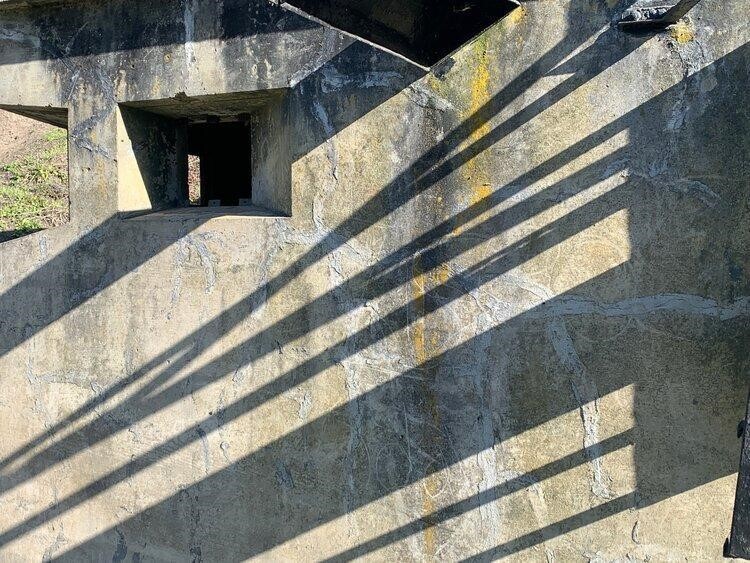
I know from experience that you are an incredible reader—that is, a lover—of all types and levels of attempt. Among your students, your openness, as well as your swashbuckling editorial skills, is legendary. What, lately, are you loving?
I'm loving what I always loved, in new locations. Elegant or energetic structures, unexpected, discontained—suggestive of the spirits that exceed the letter. Just the way I love a field or tree in several kinds of time: the weathers and the seasons, the unrepeatable surprises and the lovely analogics. Luckily my time (though getting short) is also getting deep. I love the axes (not the hatchets but magnetic fields) that stir or stripe a landscape when the lights are right.
And what relief, just to outlive the years when I imagined I could keep on top of time.
A low-ball paycheck at just one low-residency program without benefits can’t always pay the rent, and then the luck's considerable that can afford a soul an academic chair somewhere like Iowa or Berkeley, Stanford or Columbia, Seattle or UCLA, where my practices were never micromanaged.
But half the work you get in big state universities is bureaucratic: Filling out the forms and syllabi and grade sheets—fence repair for questionable field designs. Why weren't the poets near the painters and pianists? (At heart I’ve always been an underminer—or a reconceiver—of taxonomies.)
Still, in workshops and craft classrooms, the conversations were their own art-in-practice.
With your generosity toward the work of others as a basic trait, does that make it difficult for you to discern differences between what you like and what you love?
Paid well or not, a teacher’s answerability is clear. The less you personally like a student, then the more you owe them. It's not the most gifted students you wind up spending the most time on; they don't need you much. It's the ones whose gifts aren't clear, whose destinies aren't necessarily apparent. Caring’s not indulgence, it’s the longer work, to frame a world we all can live in. Rankings? Credit-ratings? Eek. I teach to find what people still can teach me back. It isn't always literary learning, strictly understood. When that works right, you highlight every writer's own originalities, the quirks and power sources that can prompt in others some responding passions, unexpected gravitations—not toward imitation, necessarily, so much as toward their own uncopyable marks. Once, in a meeting of very mixed talents at a summer writing conference, I interrupted our close readings to remark, outside the classroom window, a small bird flying straight into some plastic netting on a fence, there to be snared, flapping frantically. Up jumped the least distinguished of all the poetry characters — a late middle-aged local who still lived on her father’s farm and seemed to struggle to make poetic leaps or connections. Now however without a word she strode out the door to the bird’s entanglement, and promptly, as we watched from our paralyzed viewing chairs, steadied the bird in one hand, with a calm indifference to the attacks from the terrified beak, while she calmly unlaced the claws and wingjoints to hold the animal free in her palm. It blinked once or twice, then flew. Hers was the gift that awed me, and has stayed with me these many years since.
And as for art: If it’s about discovery, then I'm about it too. (A poem’s “about” something, Allen Grossman says, the way a cat’s about a house.) I follow my nose. There’s shit and then there’s shit. (Dogs that we are.) There’s bark and then there’s wow—a tree, a treat, a gulp, a ghazal. The trail will tell you where to go. I wag my way along the trail.
How do you manage the effort to say a thing with words while at the same time pointing out the words that say the thing?
Lineated poetry is the very model of a meta-artistry. An architecture of the many meanings rising from the slenderest of means.
And all that space inside it! and around it! spaces small and large!—the differences between the links and breaks, between rests and silences—the stanza's stop and leap, the broken line, the gulf from poem to poem, all the other sorts of ends—
The connections we make, and the spaces that press out from (or deep into) those touching parts: those bounds and bonds are at the heart of poetry. The quandary is at the start: nothings that frame, all those numerous nothings that name!
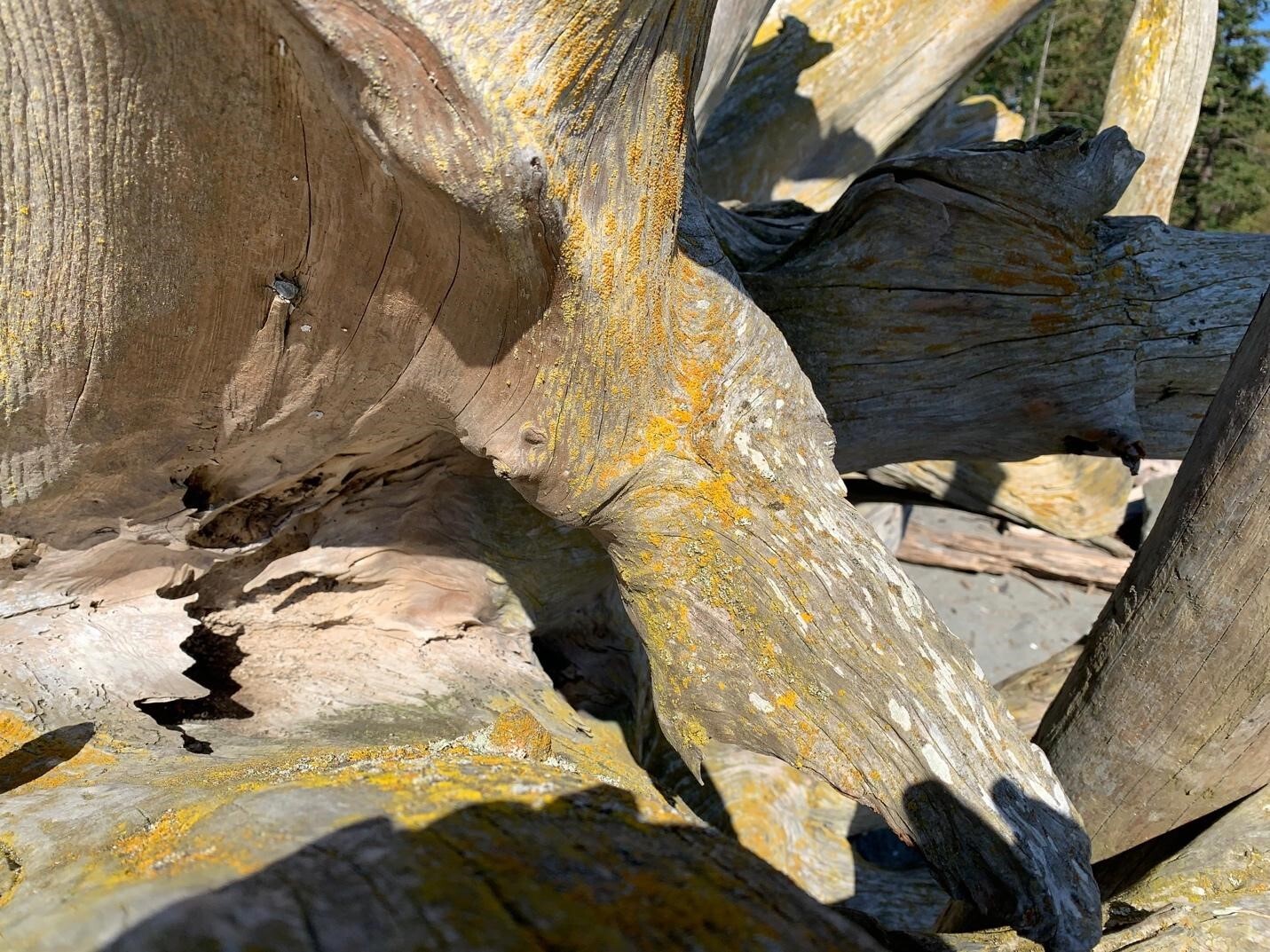
*
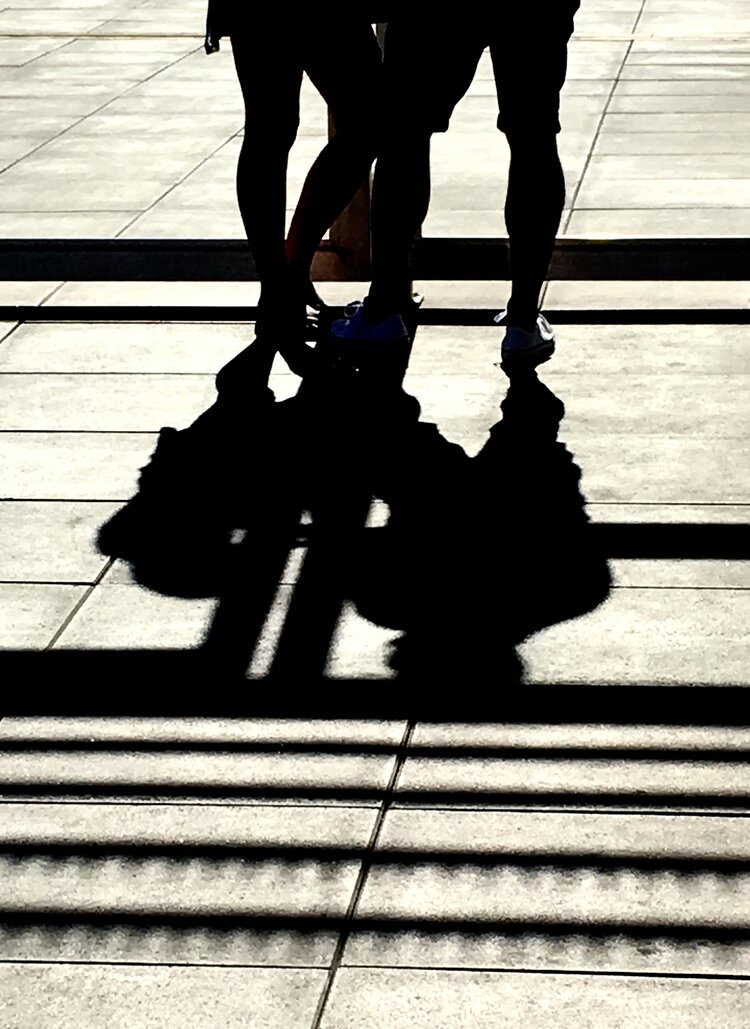
Most prose is a utility of explication. No proof or flowery persuasion is my aim. I cannot spare the time to complicate the sensory transparencies. I need a life entire to study how things look, to keep in mind the roots of skepticism. I care much less what someone else may yell about experience than I care about how we look at it. For me the art is in the shine, the slip, the surf, the serif and the ampersand, the structures we can dwell upon and thrill to represent. Perhaps I read things more materially than others, certainly than theorists are likely to; I read things more provisionally, and less polemically. I read a poem just to float five ways at once—to understand the structures of release. More than the monumental intellectual sense the mind erects as institutional, the fleeting other senses do intrigue and can enlighten us. I catch those where I can, in stills, as I race by—in stills at once revisitable and re-visible!
I love the moment most where it surmounts momentousness, the monumental most where it is lit photonic. To soar in swoops and scales (as textures crop up recognizably again from brand-new instruments), to sift the intimations there, can be a sort of luxury, of course—the freedoms of a solitude. As solitude's a privilege (when it’s not busy being agony).
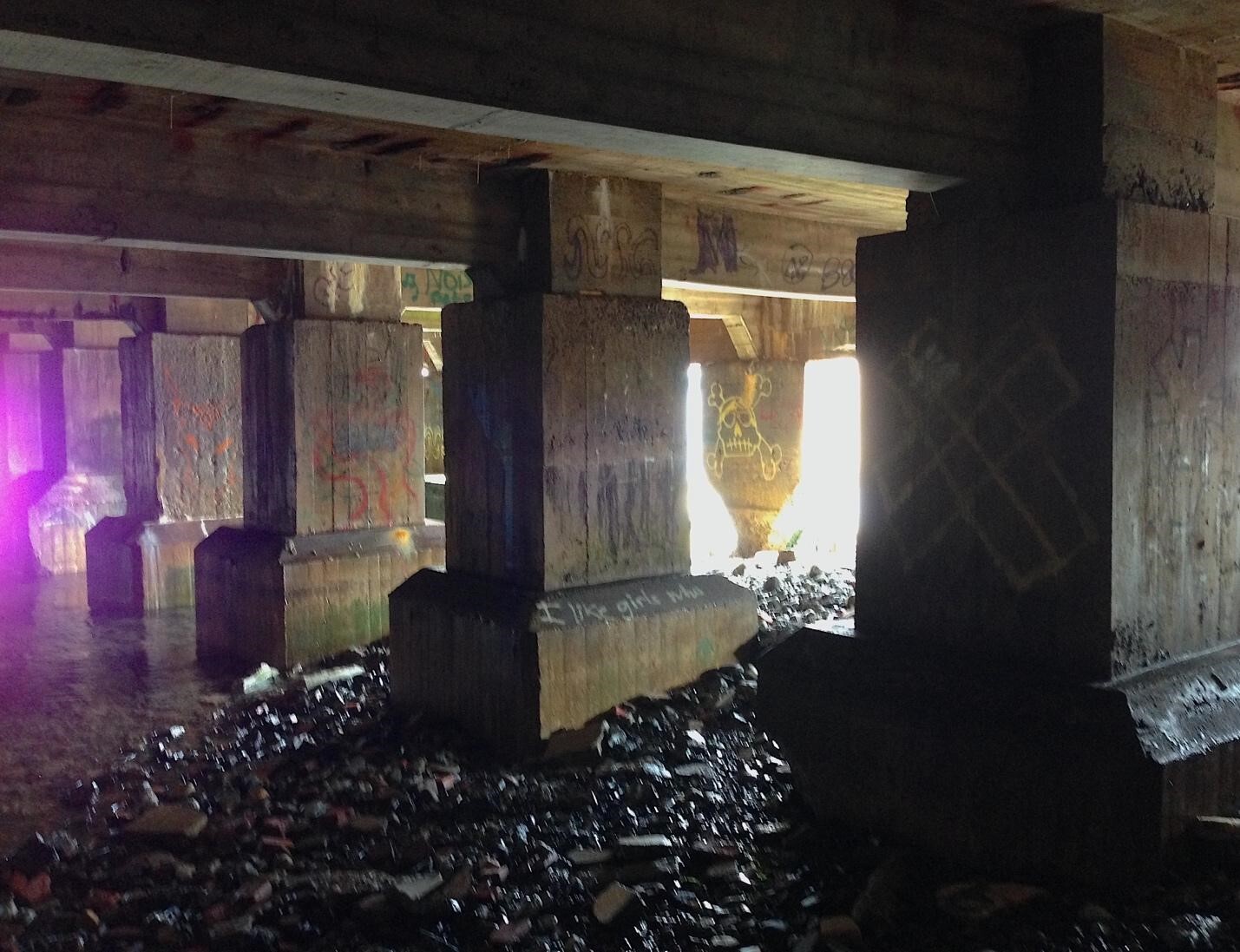
Would everything have been entirely different had I devoted more of life to 9-to-5 preoccupations? To punching clocks or raising families? I cannot know. Perhaps were I involuntarily (relentlessly) assaulted by the words and needs of others, I'd have had no luxury of choice between the known and the unknowable, the handled and the uncontainable. I’d have had other joys, made other discoveries. Meanings might not so have failed to find a home in me: I might have had to get things straight, stave off the gulfs and gaps, spend time on sanity and sanitation. (I traded parenting's accompanied pursuits for lonelier appointments—now and then my roguery gets inklings of that general achievement: I read a work aloud or sing it out among an audience, and see at times what I did not intend to mean! For better or for worse. You read it on their faces, in their turns. You find out, with surprise, not what some other people meant but, thanks to their responsiveness, what you might mean, if quite involuntarily.
And there, in that reflection, an intention turns to something like attention. Maybe that’s where parenting and art are one.)
I’d like to ask you about “Intrans,” one of the longest poems in Muddy Matterhorn, a tour de force of storytelling in which you enact the experience of a young woman’s trauma in a dentist’s office.
My god, how middle church I sound! how Bishop when I hoped for Pope! no thinking but of a self-psychologizing, or in earshot of a dental drill.
“Intrans” was notably the poem I was least inclined to include, at all, in Muddy Matterhorn, or any other book; so I’m relieved if you found it interesting at all. As far as I recall, it's the ONLY poem about which I felt I had to consult another living poet—to check my instincts about trashing it. When Rae Armantrout allowed as how it might be called a keeper, that was enough for me. I left it in the final draft. But why am I so worried?
Maybe just afraid “what happened” isn’t always, in itself, enough to merit sharing; maybe wary of unworthy or sensational self-centeredness—or merely therapeutic uses to myself. When does the urge to “get it out” deserve the efforts of a listener? Not often.
Poetry is not an instrument for winning sympathies or staging accusations. If it finds a way through its developmental fog toward some design, delight, linguistic insight, maybe it will get a little worthier of its sharing, metabolize the drag and weight of words.
“Intrans” uses, among its many materials, language preoccupied with grammar and parts of speech. As well, the poem shifts uncomfortably from person to person—beginning with the spoken-to “you” in the first section, moving to “she” in the second, and then switching to the distance and formality of the universal/specific “one” throughout the rest of the poem.
Hey, nice tracking, cowgirl. I love to see how some rare readers actually track the trail of footprints or of scent-marks in a poem, marks which, placed with care, can take an avid, unsuspecting tracker closer to the killer clue, or cull, or even just a capable corral.
Here’s the end of the poem:
Now one needs no
sentences. One needs no
hands. Just lean upon
this pillowslip, let heavens whip
the mind, the flag, the wind, the
words . . . in time they do
not flag at all, they just
wind down, and then
mind not, nor even
move. The nouns
no longer pounding things.
The verbs no longer
taking bloody objects.
I’d love to hear anything you might tell us about the making of this poem. It’s a harrowing read, and one of my favorites in the book. I’m interested in everything about it.
It ends in barely-suppressed rage, I hope, turning English against itself (the Oxford “bloody”), but aims for the professional's dispassion, stoic stillness, indignation's aftermath—a syntax saint's unhingedness. Halfway to Hitchcock, if I'm lucky. Or abutting Buddhaland.
In particular I admire the way you manage the poem’s narrative by NOT managing it; that is, how you use one subject (grammar, usage) to move into another (the traumatic experience of the poem’s young woman). Nothing new in that move (i.e., one for another), but in the case of “Intrans” and so many other of your poems, your study of the behavior of words as they play their parts of speech lands the reader again and again in hot water that feels arrived at accidentally—the hot water of memory, pain, sensory experience. Again and again your work points out the behaviors of language, and—surprise!—the behavior of language points out the behavior of humans. In the case of this poem, which subject did you start with, the particulars of the story or the peculiarities of language—the beginning or the end? And how long did you take to make it?
The end is with me, but not always consciously. The story is almost incidental; it is the language that endangers me most of all.
I work by sheer displacement, feeling in the dark, until it reads me right.
I start in the throes, and I look towards the light.
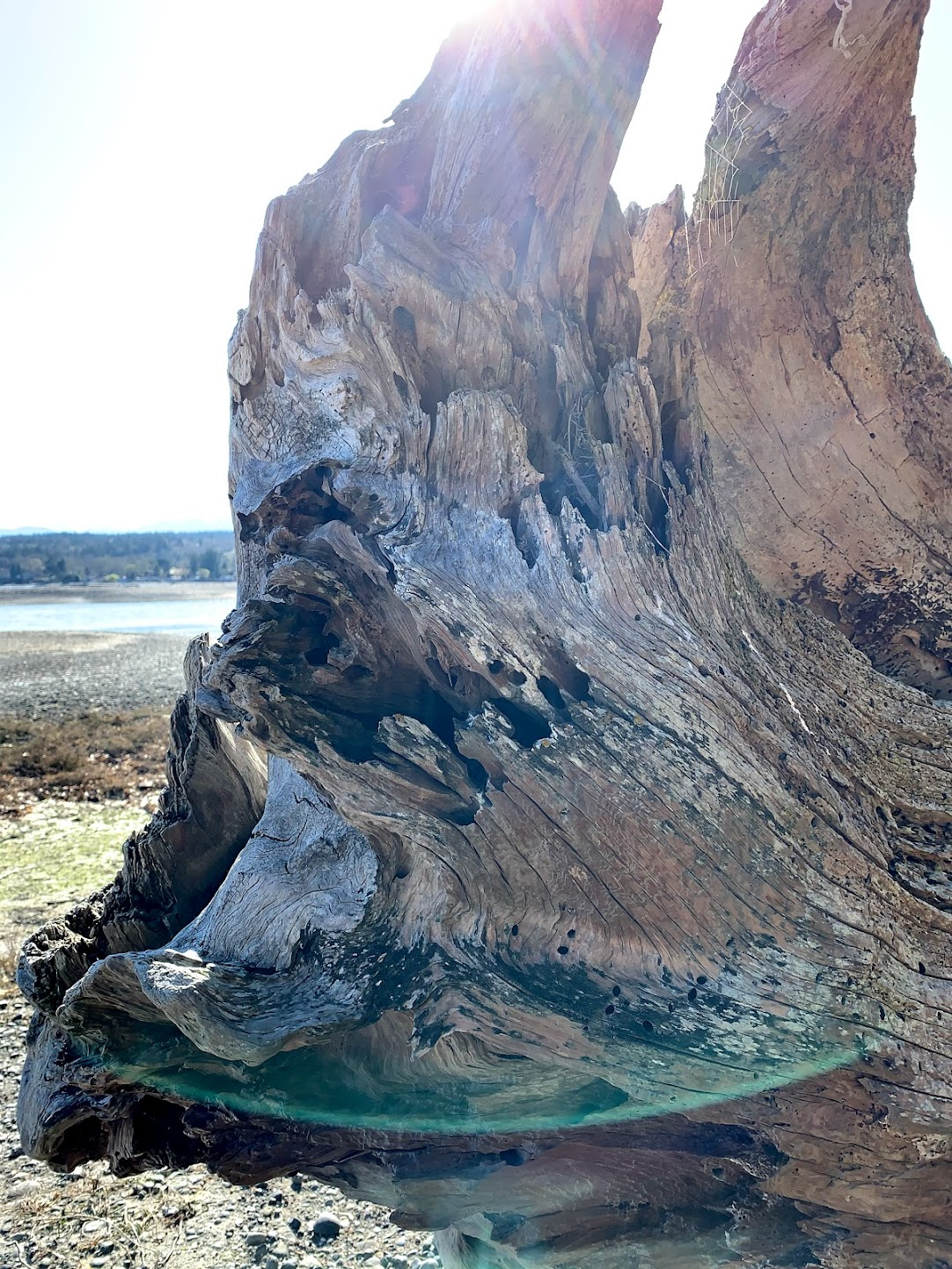
*
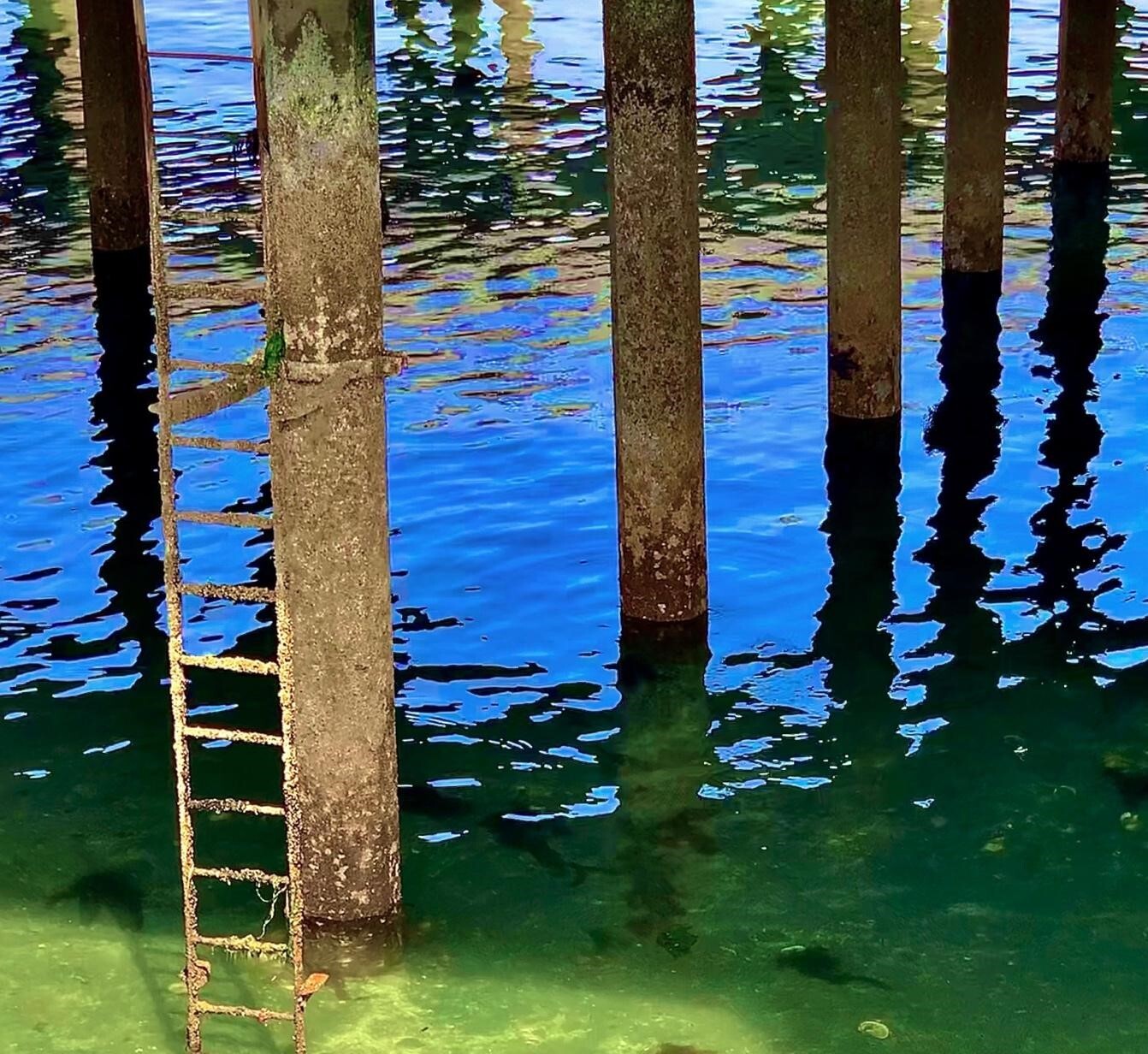
I can't recall how long it took for the poem to make its orders clear. Certainly years. I had a similarly long and ominous occasioning of poem once before. It started with the streets of Cambridge late one night where at the age of eighteen or nineteen I was walking home to my apartment; but it wasn't finished with me until the poem appeared in print some eighteen years or so past that.
You must be talking about “The Amenities,” another poem about a sexual assault.
Because of that particular night's upshot, I couldn't get the story into any fair attempt at poetry—or not, at least, until I'd lived as many years again as I had lived before it happened. (All poems go on changing until mercy or a publisher can actually wrest away the marinade and simply grill the steak. So God bless publishers and barbers, putting stops to endlessness, and cuts to bangs.)
I start with nothing but some noticer's alert, a surge of feeling, outspill from an opportunity or inquiry—a sense that something isn't done with me—a feeling in which I, for one, don't GET what happened. That lasts a while, a while in which I cannot click the testimony into shape.
I have to go through grids or grates of filter and revision, just to make my peace with the turmoil, till I'm far enough removed in time to see, to find an altitude or latitude for insight. Turn the windshield wipers on, or off. Says Beckett: tears are liquefied brain.
The inevitable response is NOT what we need poets for. The most predictable of characterizations isn't crying out for me to give it voice again: We know that voice already, and can count on a reader to bring it. But ways to better understand in words what we can’t wholly comprehend?—ways to resist meaning? or else release it?—those are the language-wrestler's challenge, since what we wrestle with can’t simply be contained.
How move an instrument like language from our dispositions to contain? If I am plunged into eternities of presence, terror out of time, my own eventual and purest feeling of release will usually lie in the precisest singing; in precisest pacing and spacing (or whatever poems do with words, and words with their ideas—ideas with emotions—all of those, in some revision of my views of how things ever come to mean).
Not fidelity (as if to one reality), but fellow feeling (as if utterly without).
I notice as I face this question that both poems took for their occasions something prominent in recent news, in cultural currencies. (Me, too.) I feel for others who have been subjected to some more overpowering misfortunes, or been bullied by too great a physical, emotional, or sexual controller (other than themselves). But I must say that even when I started writing my experience in this regard, I didn’t want too hastily to use the automatic tags for it, the “usual” denominations.
I know it’s not easy to write a poem like that, much less talk about it.
Responses to accounts of “rape” too often get the rubber stamps of pity, skepticism, or denunciation; I simply had no use for those. I never formally reported the incidents. Most rapes, I'll bet, befall the most unwary, or the least experienced; but they do befall the fearless too. I was all three.
To publicize a rape churns up a lot of extra social turmoil. While you’re working to get over grief or disbelief (which may take all your life), you’re not so well equipped for calculating politics, fighting for an -ism, determining the best denomination of account to place before the law, or staving anybody off on any other front.
We need to make our peace within, not just without. In my case neither happening could have been proven “beyond doubt;” by now I bet the orthodontist's dead. I can’t recall his name (in any case what could I do with that? At twelve I would have known him just as Dr. Something, anyway).
I only know I woke up weeping from that backroom after-hour's anaesthesia (he had no anaesthetist but in some license of his own); I know I bled; I know I never showed (in years thereafter) any evidence of a virginity to lose. What might that matter? Virginity was not the point for me, in any case, but rather things that sound, themselves, like some cliché: I wanted kindness and respect. Under sedation back in 1960, when I was twelve, what could I say I knew for sure?
Nobody else was there. All talking then, before or after, took place overhead, between my mother and the doctor she had trusted. Had he found the piece of wire he thought he'd left inside the gum? He hadn't. (No x-ray ever saw it in the dental decades afterwards). And post-sedation tearfulness, and some unprovable virginities, must happen now and then without a rapist, too.
To me, the whole experience felt less like a case to prove or prosecute, than the beginning of a lifelong comprehension test.
The second incident was clearer (what gave rise to the poem “The Amenities”). That night when I finally got home to tell my fiancé what had unquestionably happened, the account so sickened him with anger and despair I felt real pangs of guilt about the sharing. As for police? The law is like the news: you go into it as a pig and come out of it as a sausage. I'm wary of its mills. I'd rather tell a poem than a prosecutor.
I fancied I was self-repairing in those days, but maybe I was not. In any case, in retrospect, I see how many forces were at work in that young marriage—we were only teenagers, my fiancé himself a deeply-feeling sort, still wracked by sore betrayals in his own life, in his family histories. Those family members meant no ill specifically to him; neither did I; they loved him as they could; but he himself was suffering. Each story's true complexities involve a host of characters and circumstances. One's sufferings are not the only (or the greatest) ones.
I came out of my own tale with a changed awareness of some worlds of character and circumstance I had ignored. My own attacker in the street was young and actually pitiable. Despicable were those two other guys, the ones who slowed down in a car to offer me a ride, on seeing I was limping there so late, down Central towards Mass Ave. I hated them because (after I'd gratefully got in—in sheer relief at finding human help to get the last mile home—and spilled my story) they decided they would drive me anywhere but home, and did, till we were miles from my familiar landmarks. An absurd politeness kept me from protesting until, finally, from my position in the back seat, beneath the roar of radio, I heard them entertaining their own species of imagination—where to take me, how to try some variations on the theme, and more . . .
So, god knows where, at some stop sign, I jumped out of the car—then ran into an alleyway to reach some other streets where I could hide, until the driver lost the trail.
I need no poem to contain that sorrow, or to amplify
that rage. I needed poems to reveal what I could never reason out. As individuals, we may be instances for blame or pity; but I was far more interested in latent, or in overarching, patterns—in the circumstance of forces—larger meanings in our signs, our trails, the tracks we make. Not all the signs or trails or tracks are lettered, but our natures bear the marks of origin and of experience, arrays of shape and sound and depth of import.
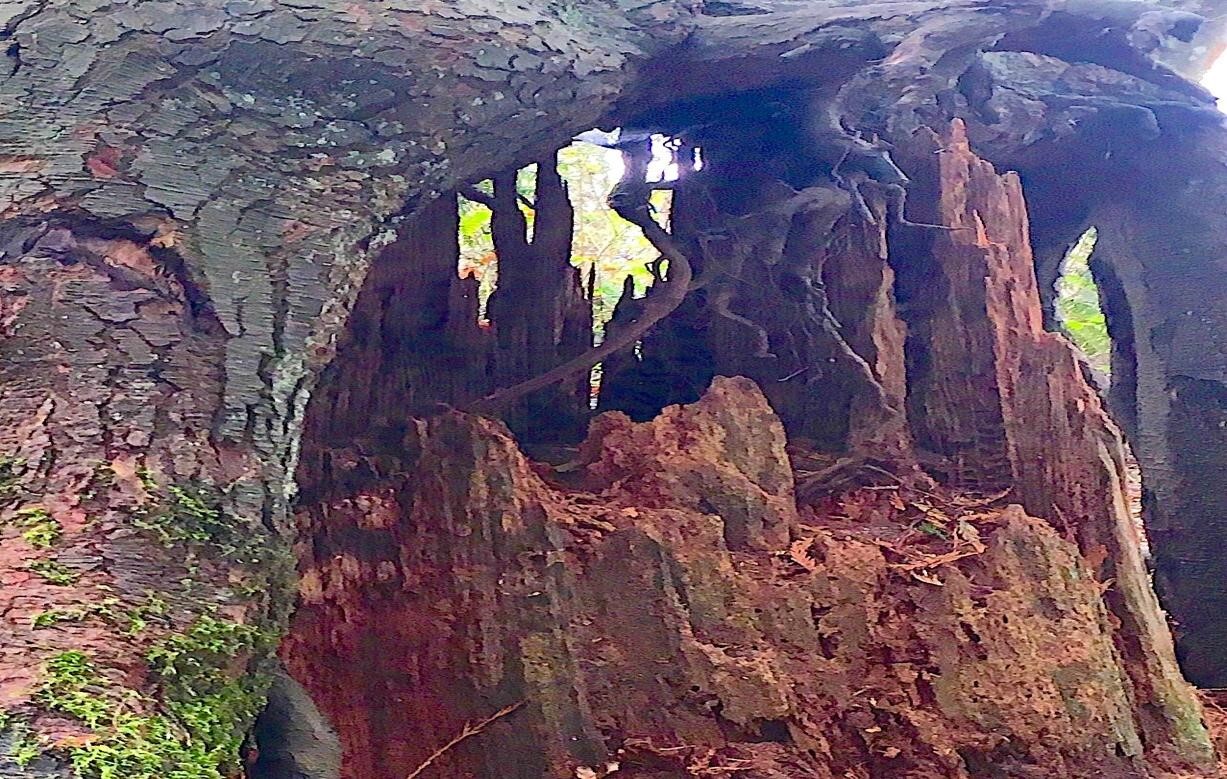
Studying the evidences gives me space: it meets my need to make some peace with (not explain away) a life’s discrepancies. I knew I’d come out close to my own kind of home, or close to whole, by my own lights, if I could learn to make some other kinds of senses, never to relinquish my own first and final freedoms: freedom to investigate, and freedom not to hate.
There's such a complicated mix of hopelessness, helplessness, and relief in that final section of “Intrans”—what Peter Turchi, in his feature on your work in Ploughshares, calls a “forced muteness . . . the loss of speech and thought that comes with death,” a state which is by turns terrifying and relieving—and often both. Would you speak to that a little? Who is a speaker relieved of speech? What is a speaker robbed of it?
A saint of muteness, or a sign of damaged goods. A bunch of wires and silicon. Oddly, a poet like myself is not primarily a speaker, though in social life I'm desperately voluble. But on the page, I mean to be a host for kinds of silence, a seeker-out of insights.
I can't stand at the four-way intersection with a great big Jesus sign and feel I've done the world, or my regard for it, an ounce of good. A word is more a provocation than a proof. I’m interested in where we're going (if “where” makes any sense)—but also what we can't stop doing, all along the way, with our inflatable designs on “getting” “there.” (The quote-marks wolf away the world.)
It couldn't have made me happy, after all, to turn around and hurt the first kid in return for what he did (though, lord, I still today would gladly slug the other two, if I knew how. But now they are not who they were. They've engineered some of their fates, whichever way they went. And I was lucky they were so incompetent in engineering mine).
We are beset by sorriest ambitions, as we aim to get beyond ourselves. I have a soft spot for the thought that we may harbor, in ourselves, more than our thinking ever knows, that we may be the very site of Rilke's Uncontainability ("Das Ungemesse")—but if we are, we waste some lovely lifetimes worrying about the nature of containers.
The alchemist (in the eponymous poem from Rilke's Neue Gedichte) suddenly understands, after years of work trying to synthesize the precious from the common minerals, how much of “value” will forever be beyond him. He'd need the moons and suns in him, the universe of the stars inside his brain, before he could begin to understand.
The poem ends with the alchemist madly weeping, babbling, "prostrate there across his magic cabinet, craving the gold that he possessed.”
The laying of blame has never brought me peace. But the finding of affiliating shapes sure does. When wood's like waves, or plastic waste is like geology, or nature reconceives authority . . .

Before we finish, I’d like to look at “The Truly Screaming Baby,” which comes toward the end of Muddy Matterhorn. The poem, which describes the experience of enduring an airplane ride with a—well, a truly screaming baby, has as its counterpart in an earlier book (To the Quick) a poem called “Point of Origin.” Same situation, really, but a different sort of speaker, sympathetic with the suffering, not just the wonderment. A change in viewpoint would be unsurprising (at least thirty-three years separate the poems) but it’s rare to encounter a set of artifacts that so clearly demonstrates the difference between an outward and an inward gaze. Do you see those two poems as a set? Do you see time or age as having worked that change in your speaker, or was it simply situational?
You see some links and some distinctions I could not! In “Point of Origin,” the baby babbled happily, discovering all things in sunshine as he ran along the aisle. (Only a few years later, stewardesses turned to Flight Attendants and were more constrained by their insurers; so you saw fewer toddlers running down the aisles.) By the time of the later baby-poem (the truly-screaming-baby poem), I myself was frequent-flier business class. With readings, lectures, residencies at far-flung colleges and libraries, I traveled as so many others did in tech and sales-biz industries, and there we were, preparing presentations on our laptops, working on our pitches. The guys in ties by then outnumbered family travelers, and seemed more automatically entitled to be irritated by a baby’s mere proximity.
The truly-screaming baby was, itself, in pain, not overjoyed at rainbows from the sun, nor just complaining at restriction in his mother’s arms. Adult complainers occupied the seats around me, guys who started muttering that infants shouldn't be permissible on planes, or that their mothers were to blame: Not one of them seemed able to extend himself into another human situation, or imagine why those ear-piercings arise—from physical forces that affected them as well, not long ago, and soon enough will bring them to some sobbing of their own.
These lines arrive near the end of “Screaming Baby”:
. . . Life’s awful,
we are slaves, if not
to parents then to poverty
or policy or pain, the grinding at the nerve,
the unexpected growth, or cavity, if not in others who
desire or who despise us, then in our desiring or despising,
under legacies of time and DNA and worse—these make us prey
to weepers, leapers, addicts, habits, wedding bells, or
verse.
One rueful message there—that life’s no rose-bed; we’ll resort to anything, even poetry! for succor—rings true, but so does the earlier demonstration—enactment, really—of wonder and delight, the destination of so much of your work. The two impressions—light and dark—seem to converge, at least tonally, in “Range,” a poem which comes, in Muddy Matterhorn’s order, just a few pages before that screaming baby—
Let’s set the lot of them
to sea at seventeen, the kids
of everyone, to work
at wonder, somewhere all
their parents once thought
foreign. Send them off before
they’re glazed or glorified,
committed to the latest therapies or
moral ardors; before they’re payable by year
or parsable by fashion. Let them float, or fly, or
somehow fathom something, literally
immersed . . .
Do you have to work at wonder? Or is it predilection? Habit?
I fear we lose it by refusing to make room for it. And yet no practice (in and of itself) accounts for, or attracts, it: Wonder crops up where it can. But you must leave it room. You settle for openness, knowing your comfort and control will turn out limited. I think I like the study of the limits, because it's where the wonder can ignite. It is my joy in life—my only hope for life. (For life, of course, is not for long.)
No wonder is central to a program of dead-certainties; it hovers at the edges, where we make no claims to know. I feel my way toward that. Too often social life appears designed to keep us from such serious unknowing: it is aimed (if not at the appearance of sophistication) then at safety, or repeatability.
But with luck, you get to spend some time off from the standard statement-making; you get caught up in life as inquiry and as surprise: you get to do some bird-watching, or worm-watching, and properly imagined, those can wow you, take your breath away. Luckier again, you get to make a living in pursuit of inquiry—without its getting hammered down in drudgery. Some scientists, philosophers, and engineers devote full organized attention to the ways things work precisely for surprise; some artists and inventors keep inclining to discovery, not just re-hash. But precious few domains of circumstance will leave us any freedom to explore.
Inventing clocks, we sold our time to twenty thousand pressing, popular, routine, or pettier concerns; concerns incorporated, every day. And then we hit the sack, to spend some time off, though in half the dreams we're racing somewhere, just to beat the damned alarm.
Go alchemize some ink, my instincts said; find voltages in verticals, or feel some verve in your magnetic field. Let people rail; just make some tracks. Record the images from opening amazements in your sleeping life, but do not duly then interpret dreams; write down their stranger tale, if write you must. Translate your EEG into a stream or sound, a score for the viola.
I was lucky to be born on earth before the era where they'd medicate a kid like me. I find my ways to entertain or to arrange intensities—I don't do boredom, and I don't do anger, and I can't bear cruelty; I've learned where I can find my brightest forms of health, inside the looming of adversity: perhaps a health in nature, or perhaps in art.
You said you’re coming to a place “where writing books may now be less and less the point.” Would you elaborate on that?
The literary surges may have been my war against the academic languages I was always overhearing, may have been the product of some long hormonal overdrives, may have been my sheer obsessive compensation for some metabolic disability. I don't much care where all the surges come from. I'm too busy handling the waves. And nowadays I do a lot of still photography. Am crazy happy on a moving boat. I do experiments with utterly unscripted acts of cooking. I feast on cinematic smorgasbords of television (arts like those of Yann Arthus-Bertrand, whose three-part mega-documentary called HUMAN is a masterpiece of extrospection). But it ain't all altitudinous: I don’t feel guilty loving me a passel of escapist trash—or setting free my inner Nancy Drew. I watch how variously weeds are growing in the yard and see the fractals in them. I take a mile-long walk around a level park and feel like Tenzing Norgay.
Many of your photos explore the reflections and textures of water. As a photographer do you find yourself “immersed” in the process of image-making in a way that is similar to or different from your experience as a poet? Do you think of yourself more as a maker or a taker of photographs?
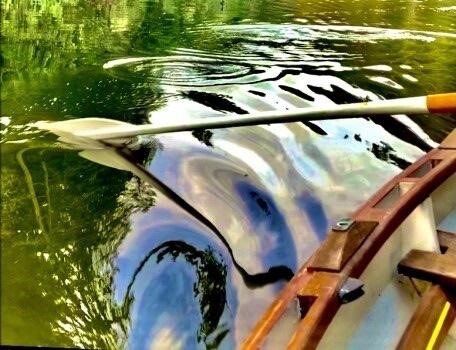
Taker, for sure! I grab these glimpses like a time-starved waif, can't get enough of evidence.
(It's not a gathering of evidence intent on any final verdict; it just keeps every living moment luminous). I cannot get enough of moment, in itself: its surfaces and incidence, its angles and obliquenesses, transparencies and depths—its sights transfix me, and defy the axes of the usual. I get my subjects happily confounded with my objects—times suspended, and intentions too.
I've always been obsessed with the degrees of transitivity in grammars—at the surfaces as in the depths.
I go to making photos as I go to making mixtapes, making food, or making love: not just to sink myself away, but rather to address the surfaces of definition, lines that tell two things together, also can tell all things apart. I go to photos, jazz, and love for their relief: they do not get me down, they save me from complete immersion.
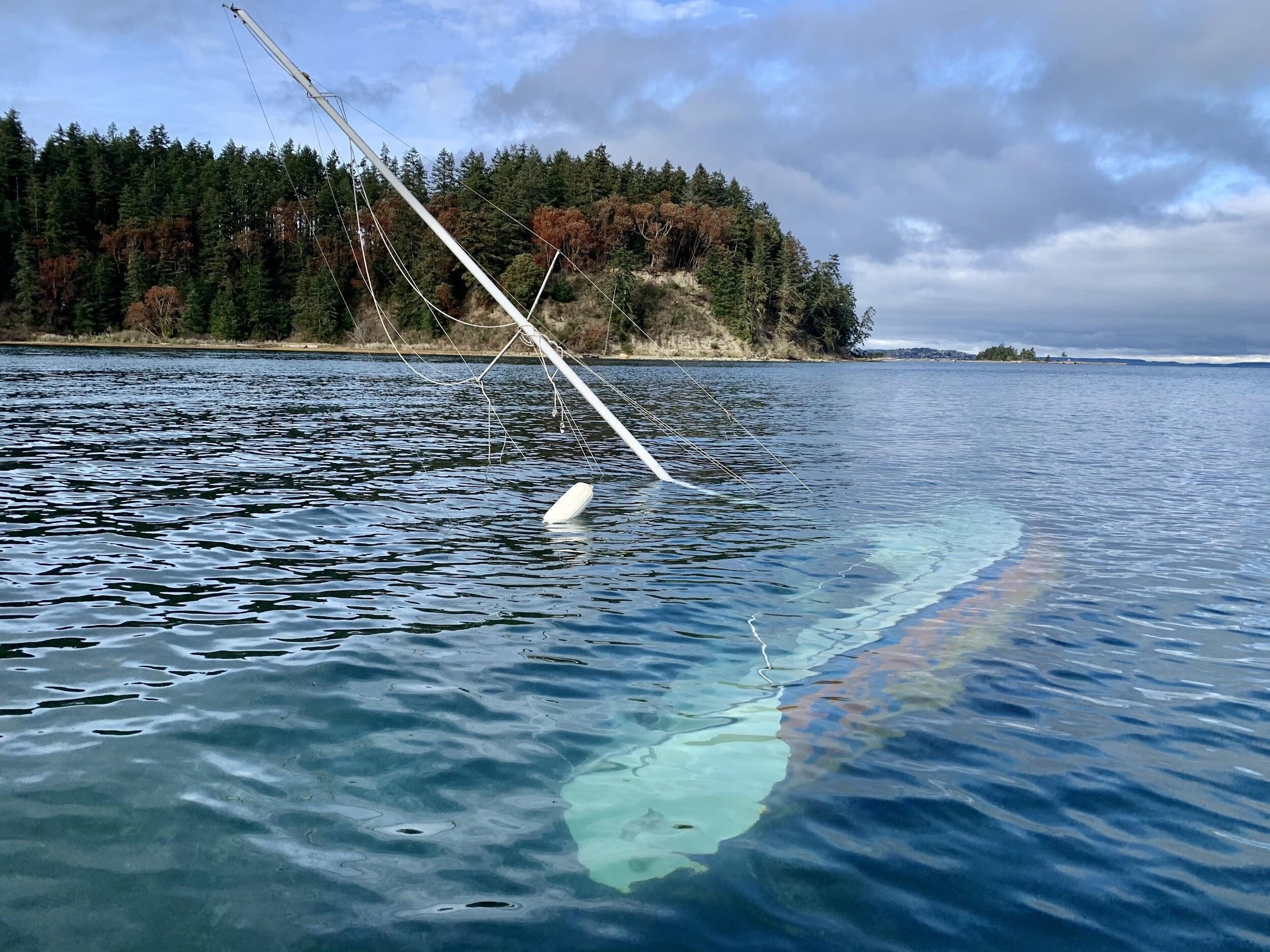
What’s it like for such a language-lover (language-maker, language-slayer!) now to practice so much art that bypasses the words?
How does it feel? A great release! In photos I can run less risk of tangling up in complicated or reductive commentary. As far as I can tell, more words don't make more light; they weary me. I had to be a poet, en route to no words at all. A photo's framing can release the onlooker from oversight, or into insight, free her from her own conceptual presumption, too much time or space invested in her own ideas of time or space.
The vision's in the shifting, not the fixity: and shifting sharpens up inside a frame. A view is not imposed: it is exposed, the act of an attention, not an intention. Framed but boundless, any still shot is revisitable: it is full of senses, and it passes all its provocations on to you. To me the snapshot's much more moving than a movie. Your own responsiveness can keep invigorating what is present, what’s presented.
And a frame releases verticals of depth, whether the frame of viewfinders, in which a shot is caught, or the frame of wordlessness around a text. In neither case—in poems or in still photography—is a how-to-guide or predisposing theory delivered. A photo or a poem is an inexhaustible occasion: invitation to the mystery.
The question "why" is useless, to the artist. It reduces vision to a point of view, experience to explanation. Art reflects our strangeness back, our warps and inclinations, vicinities we might not otherwise regard. So, in the photo just below, the antic aping of the two self-conscious teens beneath the art's reflective surfaces is underlying all the curves and curfews they can't see from their position, looking at a cameraman beyond (they cannot see the cameraman I am, behind their backs). And from the point of view I now can share with you, they seem uninterested in that older girl who (in our vantage) seems to run from all their showiness, her leg quite broken into leaps; while just beside (behind) her, in conjunctions of the curves, a tiny toddler's making more red selves, unseen as such except by us. She's turning three, inside the mirror.
In the reflections upper-right, human legs collect in layers. And at the photo's upper left, some people stand quite calmly upside down.
All living beings carry their perspectives with them, their own senses of the visible or obvious or even the conclusive. But the arts can read us back, and turn us inside out, and give us chances to regard the subjects and the objects of ourselves.
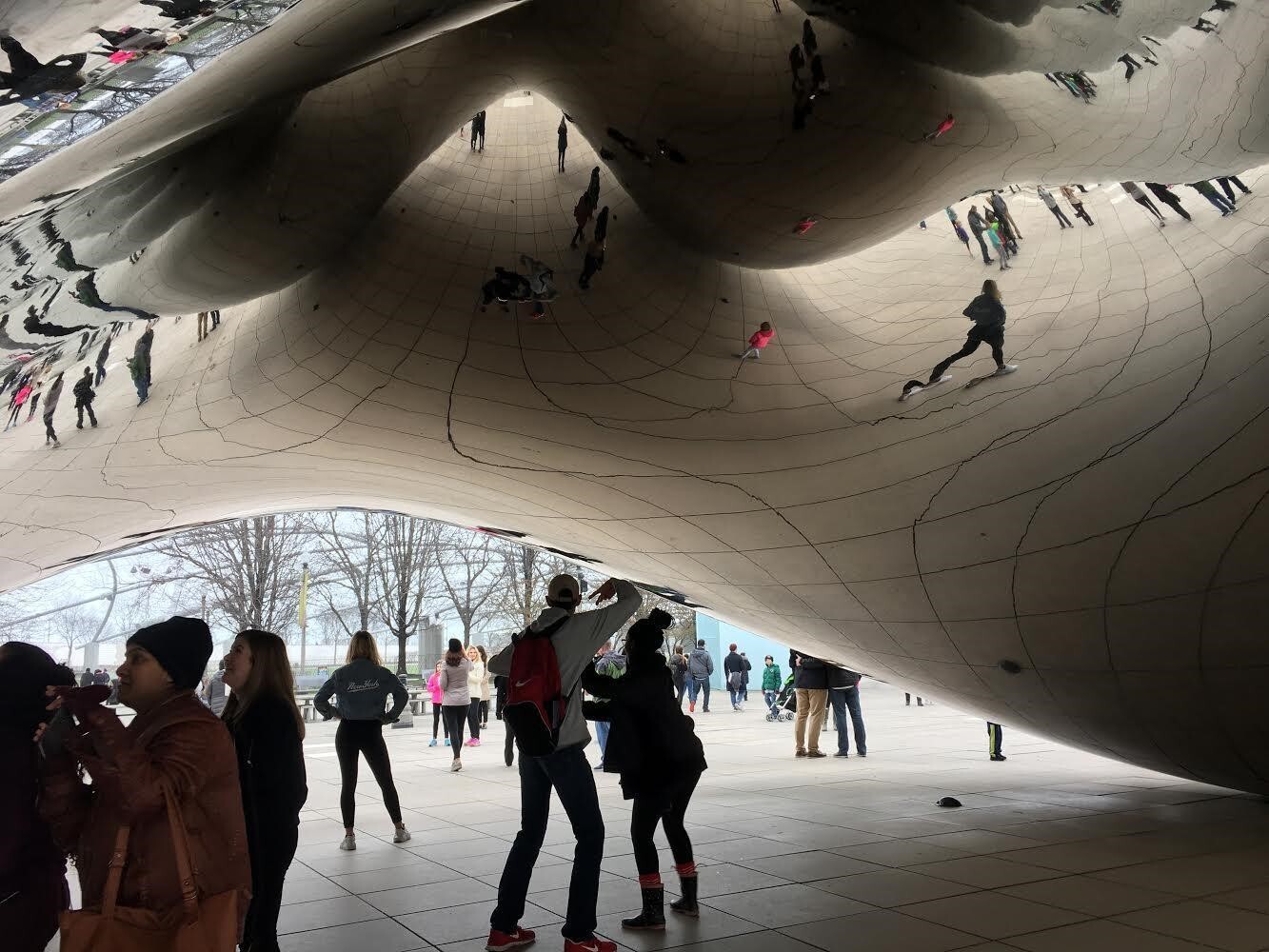
Any more photos you’d like to share, as we close?
Let's spare a moment for a couple other kids. They're in the final photo, just below. A brother and a sister, two of them transfixed (inside a ferry window) at the sight (nearby but terribly beyond their grasp) of their own, sea-sick father.
These kids do not yet know we're watching them.
You don't yet know you'll be my second person.
But look at us! all turning on the earth, all rocked by moon, all mocked by human likes and likenesses. The boat plows on, across the Juan de Fuca border, towards a customs agent.
The moment is a participle, and the photo fixes on the moment. If you save it, just by looking, it can be momentous, and the children stay that way, not far from parenthood, not far from being born, to stare forever. Where we can reflect on them. And can, ourselves, be moved.
